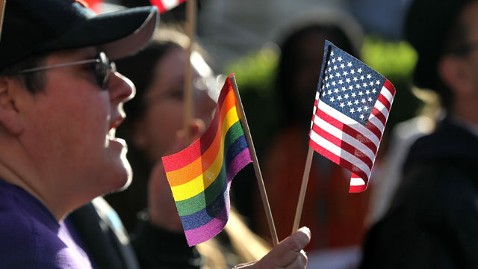Prop 8: Why 18,000 Is The Critical Number
 (Image Credit: Justin Sullivan/Getty Images)
(Image Credit: Justin Sullivan/Getty Images) In the months leading up to the passage of Proposition 8 - the controversial 2008 California ballot initiative that bans gay marriage - some 18,000 same sex couples obtained marriage licenses.
The marriages came to a screeching halt when Prop 8 was passed with 52 percent of the vote.
Today, a federal appeals court is poised to rule on the measure. Prop 8 supporters says they are fighting for the traditional definition of marriage. Opponents argue that Prop 8 violates constitutional rights.
In 2010 U.S. District Court Judge Vaughn R. Walker struck down Proposition 8, ruling that it "both unconstitutionally burdens the exercise of the fundamental right to marry and creates an irrational classification on the basis of sexual orientation."
Today, before reaching the constitutional question , the panel of three judges from the 9th Circuit Court of Appeals will have to decide whether to vacate Walker's decision because he failed to disclose at the time of the Prop 8 trial that he had been involved in a long term same sex relationship, although he was not married. Supporters of Prop 8 argue Walker had an interest in the outcome of the case.
The court will also decide whether the supporters of Prop 8 have the legal right to defend the law in court after California's public officials declined to do so. If the court finds that the supporters of Prop 8 have the necessary "standing," the court will then decide whether it is constitutional.
Judges:
The judges involved in the case are Stephen Reinhardt, Michael Hawkins and N. Randy Smith. While Reinhardt and Hawkins were nominated by Democratic presidents, Smith was appointed by a Republican. They heard arguments in the case in December 2010.
Plaintiffs and lawyers:
The case was brought by two same sex couples, Kris Perry and Sandy Stier, as well as Paul Katami and Jeff Zarrillo. The lead lawyers representing the couples are David Boies and Theodore Olson. The pairing of Boies and Olson is unusual because the two fought on opposite sides of another historic case: Bush v. Gore.
When California's governor and attorney general declined to defend Proposition 8, the official proponents -ProtectMarriage.com - stepped in to do so. Charles J. Cooper is the lead counsel.
At oral arguments Cooper told the court that the case involved a fundamental question: "Whether the definition of marriage - that momentous issue - is one for the people themselves to resolve through the democratic process as they did in enacting Proposition 8 or whether out Constitution takes that issue essential out of their hands and decides it for them."
Olson told the judges, "California has built a fence around its gay and lesbian citizens and it has built a fence around the institution of marriage which the Supreme Court says - not based upon sex or procreation or anything else - is the most important relation in life. And the citizens of California within that one fence because of their sexual orientation are denied access to what every other citizen of California has that are enclosed in that other fence. That is a violation of the Equal Protection Clause and it's a violation of the Due Process Clause."
Currently six states and the District of Columbia issue marriage licenses to same sex couples: Massachusetts, Connecticut, Iowa, Vermont, New Hampshire, New York and the District of Columbia.